Wine is communication. But how do we communicate when we describe wine? Is there anything wrong with dressing sensual pleasure in sensual words? Does it have to be cryptic or even lyrical? Or just factual and comprehensible? Where does the future of wine lie? How do you introduce young people to the subject of wine? And how do you communicate wine in a contemporary way in a consumer world that is becoming cheaper and cheaper?
"Wine needs a new language, it needs to be demystified and demystified."On this point, all three interlocutors agree who Wein-Plus asked to sit down at the table to kick off a new series of talks: the sworn wine appraiser, author and gastronomy consultant Otto Geisel from Munich, the author, entrepreneur and wine merchant Martin Kössler from Nuremberg and the author and wine critic Marcus Hofschuster from Erlangen. Cyriacus W. Schultze was the moderator.
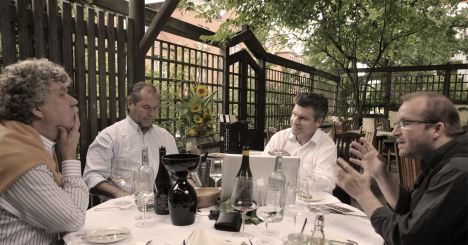
|
| Wine in conversation: Martin Kössler% Otto Geisel% Moderator Cyriacus W. Schultze% Marcus Hofschuster (from left to right) |
"An elegant, floral bouquet, a firework of vegetal, delicately spicy aromas, underpinned with a hint of ripe pineapple, animating grapefruit and slightly herbal components, with mineral hints in the background. On the palate, a beguiling, delicately sweet fruit with a playful spiciness and harmonious acidity, balanced, fantastically dense, yet weightless and clear as a bell in structure, plus wonderfully juicy and a buoyant, playful mineral finish."
Let's take this fictitious example for a tasting note. To what extent is such a wine description appropriate?
Marcus Hofschuster: First of all, it should generally be said that the quality of a wine can only be explained to a layman to a limited extent.
Otto Geisel: Yes, the question cannot be answered like that. Describing wine is also about cultural understanding. In my opinion, many wines cannot be described without food, or a description alone would make no sense.
Martin Kössler: Wine is communication. It communicates with the wine drinker, and it must be possible to put that into words. In this respect, a wine description has various aspects. Wine descriptions need a context, they have to include both the consumer and the producer, in a sense the technology.
How do we communicate today when we describe wine?
Martin Kössler: The language of wine is not comprehensible to everyone. I notice this, for example, with my daughters' friends who have hardly any experience with wine. You have to create bridges of association, bring emotion, regionality and context into the description or explanation.
Otto Geisel: My daughter is in her mid-20s and drinks white wine and champagne, but she doesn't like red wine. She says it smells old. And by that she means the seemingly old, dusty world of her father.
Marcus Hofschuster: These morbid tones in red wine can also come from old wooden barrels. In any case, women have a different approach to wine, they think differently and perceive differently. We men can learn a lot from that. I myself learn more and more when I listen to women talk about wine.
Otto Geisel: Women are more precise in their expressions, they need fewer words.
Martin Kössler: Yes, women are less emotional.
It is commonly said that the opposite is true. It is often said that women are much more emotional and talkative than men. But once again the question, perhaps formulated a little differently: What does a wine description have to do?
Martin Kössler: We need to use the term "good wine" again and explain what it is. In our wine trade we have noticed: The more factual and precise the description of a wine is, the less it sells. In contrast, you often only need a word like "terrace wine" and it sells. There's simply cinema in your head. Many wine descriptions we read today are elitist and downright ridiculous. Instead, we need sensuality - anyone can do it and it costs nothing! We need to encourage people to use the senses they have.
Marcus Hofschuster: The problem is that even many professionals can't use their senses properly and therefore have to hide behind these turgid and woolly formulations. There are far too often only positive marketing terms involved, it's too superficial.
Martin Kössler: But there can only be a different wine language in a larger context. Everyone, or at least as many as possible in the industry, must change their language. We have to convey the experience of drinking wine. That's why we should only communicate sensuality and no analytical values at all. But it's also not about "tastes good to me" or "doesn't taste good to me". Wine doesn't taste at all, wine feels.
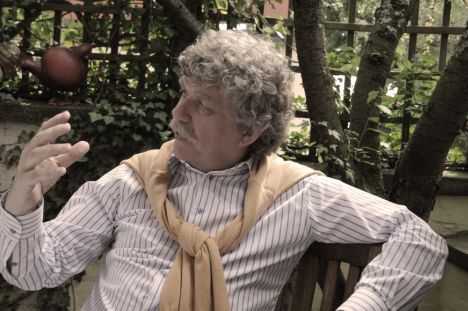
|
| "The more factual the description of a wine, the less it can be sold. We need more sensuality!" Martin Kössler |
What are the tasks and possibilities of wine criticism?
Marcus Hofschuster: Wine criticism serves to communicate wine.
Martin Kössler: I think the separation between winemaker, critic and merchant in wine description must be abolished. Everyone should be able to talk about wine.
Marcus Hofschuster: No, this separation is important, because many consumers and also many traders have no idea. There is too much mumbling, incompetence and superficiality in the industry.
Otto Geisel: That is unfortunately true. In Germany we have the least knowledge and the least receptiveness when it comes to food, its origin and its quality.
Martin Kössler: It is important to have a healthy flow of information that benefits everyone.
Otto Geisel: A very important aspect of wine criticism or wine description is that it is not made for sommeliers, oenologists or other experts.
Marcus Hofschuster: That's right. In Focus must always be the customer, and in this respect wine criticism is in a way also a kind of training.
Martin Kössler: Exactly! The wine critic mediates between the producer and the consumer. A good wine description must have a sensual-educational aspect. But there we have another problem with competition law in Germany: a factual-critical wine assessment is already a tightrope walk, that's why there's only cheering everywhere.
So wine criticism serves the training of the wine drinker. training what for exactly?
Otto Geisel: I definitely disagree. There is no mathematical formula for taste, it is always subjective. For many people, stockfish, for example, is a delicacy, while others find dried fish disgusting because it doesn't smell good. And because taste is so individual, I don't think wine criticism can be educational, that would mean egalitarianism. It can only be about perceiving things in a more differentiated way. Each of us has innate knowledge: What tastes good to us is good for us. It is not something we are taught, it is something we carry within us. So all we need is more self-awareness to recognise what tastes good to us individually and therefore does us good.
Martin Kössler: That's what I mean by the educational aspect: training to a self-confident taste.
Otto Geisel: Good, so it's about having more courage to have one's own opinion.
Marcus Hofschuster: Of course, wine criticism cannot dictate what someone individually likes or tastes, but there are objective criteria for quality that can be agreed upon in the long run. Thinking a little further, this means that there are subjective thresholds for the perception of unambiguous criteria. To take up the example of the fish again: there are also wines that don't smell particularly good at first and have distinctly animal tones. Then, as a critic, I have to decide whether what I smell is bad, i.e. faulty, or merely unusual and idiosyncratic. That is where the educational task begins.
Martin Kössler: training means naming what happens when you smell and taste the wine. The entire world of wine and food is, after all, overlaid by industrialisation, which sets standards and generates uniformity. Wine criticism must therefore go far beyond the wine itself, it must include cultural aspects and - I say it again - place the wine in its context. 70 per cent of all wines in Germany are sold on the self-service shelf. That's where wine criticism has to create a definition of quality.
Marcus Hofschuster: Wine criticism must explain the wine and offer the customer a choice.
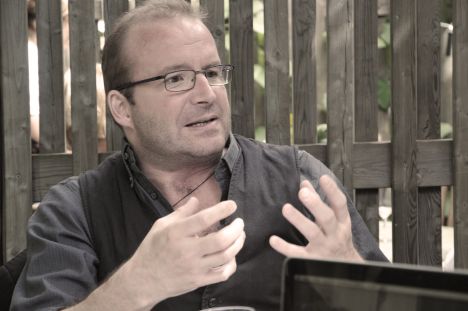
|
| "Points alone can never make up a wine assessment% but can only provide orientation in addition to the description" Marcus Hofschuster |
How are wine descriptions and point ratings connected?
Martin Kössler: Due to point ratings, we have forgotten how to describe wines appropriately using language. Numbers are no more unambiguous than words, and many wines cannot be evaluated by points at all.
Marcus Hofschuster: Points alone can never make up a wine assessment. They can only provide orientation in addition to the verbal description. However, many critics also award high scores because of attention: The higher the score, the more likely the critic or wine guide will be quoted in the media and mentioned by the producer or retailer in their marketing. But you have to ask yourself about the demands on the point system.
Martin Kössler: If all critics only score as high as possible, the points become worthless and other values gain in importance. Points belong on supermarket shelves and have no place in the higher price segment - except perhaps in Bordeaux because the wines there are standardised. Points say nothing about the style, sensuality or regionality of a wine. We need wine descriptions that do justice to the true taste and character of the wine. In this respect, points again presuppose the context.
Marcus Hofschuster: The context depends on the experience.
Martin Kössler: There are two developments on the market: one direction is conformity, i.e. standardised wines, the other direction is individuality. For the wines of the first category are the points, the wines of the second category cannot be captured with points at all.
Marcus Hofschuster: Yes, they can. The wines of the first category will only ever have fewer points. In this respect, points are definitely a quality criterion. If you taste wines with the same number of points against each other - as we do in our daily re-tastings - you notice how individual a wine is and find out the fine differences on a quality level.
Martin Kössler: In any case, despite the supposed technical measurability via points, there is no objectivity that could stand alone. You need the language to convey it, and it's about finding your own sense of quality. The industry is in a cul-de-sac if it retreats only to points. Then people only buy points, but no wine - and that is already the case today in many cases. The character of the wine and the personal taste of the customer fall by the wayside.
Does the customer want and need supposedly elitist and technical language? Don't they just expect a pragmatic statement from their trusted wine merchant or sommelier, such as "You'll like this one", "This is the type of wine you like", "It goes well with fish" or "We always like this one"?
Martin Kössler: "This one is always a favourite" makes me get up and leave!
Otto Geisel: If the sommelier tells the guest "You'll like this one" and is confident, that serves its purpose. Italian restaurateurs are a good role model in this respect. We all know this trattoria effect, when we eat more than we actually wanted thanks to the padrone's recommendations and try wines we had never heard of. It's all about persuasion and a certain basic trust.
Martin Kössler: And emotion. From a merchant's point of view, I can say: we ask people. Everyone sits in a drawer with their taste preferences. The emotional factor, one's own experience, plays a very big role. We find out in which drawer the customer sits with his taste in wine and then recommend the right one. When a couple gets out of the car, I can often predict how the sales talk will go. And if I say in the conversation, "This wine is not for you" and give reasons, people start to think. They should learn to understand taste as a feeling.
Otto Geisel: Anyone who chooses wines at a retailer or in a restaurant as a host has a great responsibility and will, in case of doubt, follow his own preferences. In order to find a consensus on taste, professional advice is helpful. We need wine descriptions to give people who want to please their guests more confidence.
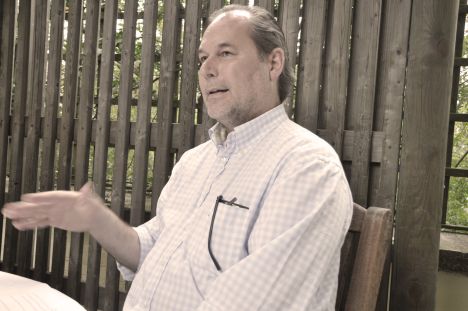
|
| "A good wine must explain itself in its own way and does not need an instruction manual" Otto Geisel |
How do you introduce young people to wine in the future?
Otto Geisel: The key is openness to taste.
Marcus Hofschuster: Yes. Young people are the most open-minded and often come to wine through cooking.
Martin Kössler: We also notice that. Younger customers often bring their cooking recipes with them and have the matching wine recommended. We have to show people wines they don't know yet. And that can only be done through words. Just a few fitting words about the sense of taste are enough. It is the word that makes the wine a wine. And the young consumers have to be picked up with the pleasure approach, they have to be made to feel pleasure and enjoyment.
Otto Geisel: Good wine doesn't need an instruction manual.
Marcus Hofschuster: But many people need help.
Otto Geisel: The consumer - and the producer and the trader as well, by the way - must recognise the natural connections and get involved with them, only then can they understand a great product. Let me give you another example: good cheese stinks. Where the milk comes from can hardly be distinguished regionally, but in cheese production it is transformed under regional influences, and individual cheeses can very well be distinguished in their origin. Where the spirit of place works, individuals emerge. In terms of wine, this also brings us effortlessly to the concept of terroir. The wine description must lead the consumer into the cultural space of the wine. A good wine must then explain itself in its own way.
What does wine criticism of the future have to do?
Martin Kössler: It must also create a sensitivity towards the production process. It is unbelievable how great the ignorance is, and that can only be changed through the word. Wine is a word, and that comes from subjective experience. It is so easy to give consumers certainty. We have to describe the vintage, explain the weather and the effects. Then people understand.
Otto Geisel: I think that's going a bit too far.
Martin Kössler: But we can't lament and do nothing! I have often had good experiences when I have explained the character of a wine through the climatic course of the vintage. By the way, another point on the subject of wine education: wine plays no role at all in German cooking programmes. That is very much the case in other countries.
Otto Geisel: And product knowledge plays no role whatsoever in cooking programmes in this country.
Marcus Hofschuster: Yes, unfortunately. The little tricks that are shown are much less important than the quality of the products. And upscale regional cuisine that goes well with a good local wine is hardly to be found in Germany.
Martin Kössler: So, we have to create a different feeling for wine and get wine out of the elitist corner. We have lost the feeling for quality criteria.
Otto Geisel: Worse: we have no quality definition at all in the food sector.
Martin Kössler: Germans learn what food quality and culture means on holiday. We virtually have a lost generation in Germany.
Otto Geisel: That is unfortunately true. In medical terms, a distinction is made in this context between pleasure doubters and pleasure rejecters. By the way, people are now also trying to cure depression through sensual experiences - enjoyment as therapy.
Martin Kössler: We have a social task to establish wine as a popular drink. For this to happen, values must change and enjoyment must be given greater importance.
Otto Geisel: We may be living better and better, but we are not living healthier. Sustainability ends in the annual report for most companies, and society in Germany is becoming culturally impoverished. Wine means sustainability because it shows a development of nature and preserves it so that it can be experienced again and again. Then an image is created in my mind's eye when I smell and taste a wine.
Martin Kössler: Exactly, it's about the taste experience, that's what the media must also communicate. We have to democratise the topic of wine through the personal experience of quality, so that people don't only look for highly praised prestige wines, but also learn to appreciate small wines.
Otto Geisel: This democratisation has already begun with the many wine blogs. That's a good development, wine is not a topic for a secret club.
Marcus Hofschuster: The wines in the lower and upper price ranges are mostly drunk by people who are not really interested in wine. They go by point ratings or bottle features. The wines in the middle price segment are mostly drunk by people who are interested.
Martin Kössler: That's right, the middle is where the future lies, it has to be recreated, and that's where proper wine descriptions are important. The media and wine guides would have this task and responsibility, but they don't take it because they only reduce themselves to the points. People need to be given more feeling for the product, they need to understand that for under five euros you can only expect a machine-harvested wine.
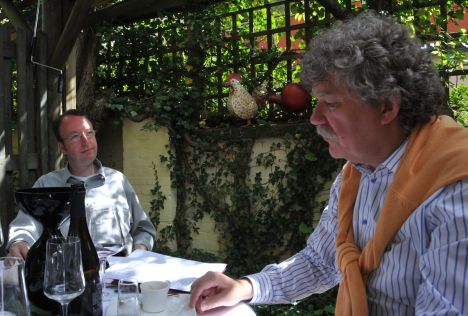
|
| "The task of wine criticism is training to a self-confident taste." Martin Kössler (with Wein-Plus editor Carsten M. Stammen) |
Where is the global wine market heading in terms of price and quality?
Marcus Hofschuster: Well, a lot of things are going further and further towards banality - and in Germany this egalitarianism is called: yeasty, sugary, brightly fruity, superficial.
Martin Kössler: I said earlier that the market is splitting - on the one hand, uniform, industrially produced wines, on the other hand, individual, handcrafted wines. Regionalisation will remain a trend, but we cannot completely escape the globalising influence. We have to emphasise the individual wines more and train people's judgement here. By the way, a trend like that of Orange Wines, in my opinion, also only arises from the attempt to break out of the normal and the longing for values and individuality. There is still a lot of insecurity involved.
Otto Geisel: The acceptance of higher-quality food is increasing, which means better market opportunities for good wines.
Martin Kössler: Wines in discount grocery stores will only be able to distinguish themselves through the point ratings. The problem, however, is that the world of production cannot be put into points. Many supermarket wines are shockingly good nowadays, they are trimmed to a pleasant taste sensation. This then hits the producers in the middle segment who cannot deliver comparable quality at that price. So there will be a market shift.
What authority protects consumers from paying too much for low-quality wines?
Marcus Hofschuster: People don't need protection. As long as a wine is technically flawlessly made, they should buy it.
Martin Kössler: An industrially produced wine that is of good quality by its standards is a high-quality beverage-technological product, but it has no story to tell. Viticulture is the winner of the crisis. Biodynamics is no longer an ideology, but lived practice. Good, individual wines are already made differently in the vineyard, the result is not created in the winery - unlike marketing wines. But consumers want such standardised marketing wines because they promise stability and orientation. On the producer side, on the other hand, there is now a rethinking taking place. It is the first time that producers are ahead of the market: Many quality winemakers today make wines that are not yet marketable. That's where the right communication is needed.
Otto Geisel: I see it that way, too. If the winegrowers understand and implement the natural connections, then wines can be created that are exceptional.
Martin Kössler: And this quality must be communicated. That is the new function of wine criticism.
Let's summarise then: Wine needs a new language. Is that so? And if so, what should it look like? What purpose must it serve, for whom and for which fields of application must it be made?
Martin Kössler: You can't reach people with elitist wine descriptions and elegies of empty words. We have to create a new wine language by making it a topic itself, by talking about it - as we are doing here today. We - and that means all of us: traders, journalists, sommeliers and producers - must give language a function, it must convey a concrete content.
Marcus Hofschuster: That's how it is. The language in wine descriptions must say something and be comparable. The same terms must mean the same thing.
Otto Geisel: Wine language must become simpler, we must reduce and demystify the descriptions. Wine criticism must lead people to their own experience, they must perceive with their own senses. There is no binding force for taste. What is not stored as taste cannot be perceived as taste. People need more self-confidence and courage for their own taste, and for that they need information and also some guidance.
Martin Kössler: I completely agree. Wine descriptions need to become more contemporary, and that means fewer words, but precise. And - to pick up on this briefly - if something is stored as a taste, this happens via the terms, via the language.
Marcus Hofschuster: We have been working for almost 15 years on concentrating on the essentials in our tasting notes. For us, the same words always mean the same thing. But we can also become, let's say, more human and arouse even more interest in wine. The criticism should be as objective as possible and must neutrally work through subjective criteria detached from personal preferences. So I also have to appreciate that a wine is technically well made, even if I don't like it myself. That is also an aspect of neutrality: the critic should not and must not impose his own taste on anyone, but describes his perceptions.
Otto Geisel: The wine experience takes place on the emotional level. People are much more confident in choosing clothes, cars or music than in their own sense of taste. Here, wine criticism can take on an important guardrail function for the consumer's own taste by showing him the way there, giving him incentives to go this way and accompanying him.
Thank you very much for the interview, gentlemen.